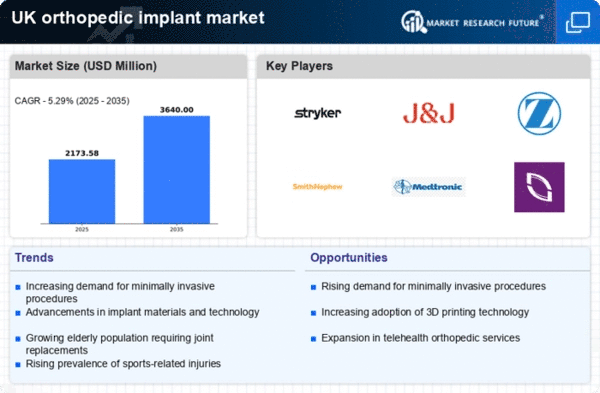Advancements in Implant Materials
Innovations in materials used for orthopedic implants are significantly impacting the orthopedic implant market. The introduction of biocompatible materials, such as titanium alloys and polyethylene, enhances the longevity and performance of implants. These advancements not only improve patient outcomes but also reduce the risk of complications associated with traditional materials. For instance, the use of porous titanium has shown promising results in promoting bone integration, which is crucial for the success of orthopedic procedures. The market is projected to benefit from these technological improvements, as they lead to better surgical outcomes and increased patient satisfaction. Additionally, the development of smart implants that can monitor patient recovery is likely to further stimulate interest in the orthopedic implant market, as healthcare providers seek to leverage technology for improved patient care.
Growing Awareness of Joint Health
There is a notable increase in public awareness regarding joint health and the importance of early intervention in orthopedic conditions. Campaigns promoting healthy lifestyles and the prevention of joint disorders are contributing to a more informed population. This heightened awareness is likely to lead to earlier consultations with healthcare professionals, resulting in increased demand for orthopedic interventions. The orthopedic implant market stands to benefit from this trend, as patients seek solutions for joint pain and mobility issues. Additionally, educational programs aimed at healthcare providers are enhancing the understanding of the latest treatment options available, including advanced implant technologies. As more individuals recognize the importance of maintaining joint health, the market for orthopedic implants is expected to expand, driven by proactive healthcare-seeking behavior.
Government Initiatives and Funding
Government initiatives aimed at improving healthcare infrastructure are playing a pivotal role in the growth of the orthopedic implant market. In the UK, the government has allocated substantial funding to enhance surgical facilities and promote research in orthopedic technologies. This financial support is crucial for hospitals and clinics to adopt advanced surgical techniques and invest in high-quality orthopedic implants. The NHS has also launched programs to streamline the approval process for new implants, encouraging innovation and competition within the market. As a result, the orthopedic implant market is likely to see an influx of new products and technologies, which could enhance treatment options for patients. Furthermore, increased funding for public health initiatives may lead to greater awareness and early diagnosis of orthopedic conditions, further driving demand for implants.
Increase in Sports-Related Injuries
The rise in sports participation among the UK population is contributing to a higher incidence of sports-related injuries, which in turn is impacting the orthopedic implant market. As more individuals engage in recreational and competitive sports, the likelihood of injuries such as fractures and ligament tears increases. This trend necessitates surgical interventions, often requiring the use of orthopedic implants for effective treatment. Data indicates that sports injuries account for a significant portion of emergency room visits, highlighting the need for timely and effective orthopedic care. Consequently, the demand for implants designed for sports-related injuries is likely to grow, as athletes and active individuals seek to return to their activities as quickly as possible. This dynamic is expected to drive innovation within the orthopedic implant market, as manufacturers develop specialized products to meet the needs of this demographic.
Rising Incidence of Orthopedic Disorders
The orthopedic implant market is experiencing growth due to the increasing prevalence of orthopedic disorders in the UK. Conditions such as osteoarthritis and osteoporosis are becoming more common, particularly among the aging population. According to recent data, approximately 8 million people in the UK are affected by osteoarthritis, leading to a higher demand for joint replacement surgeries. This trend is likely to drive the orthopedic implant market as healthcare providers seek effective solutions to manage these conditions. Furthermore, the National Health Service (NHS) has reported a rise in hip and knee replacement surgeries, which are essential for improving the quality of life for patients suffering from debilitating joint pain. As the population ages, the need for orthopedic implants is expected to continue to rise, indicating a robust growth trajectory for the market.
















